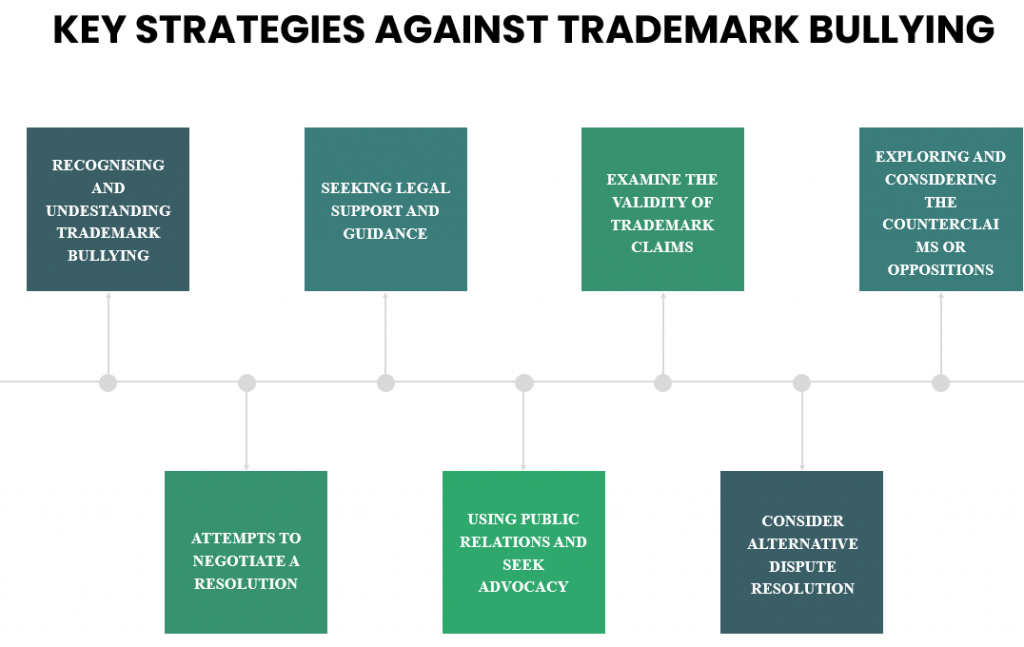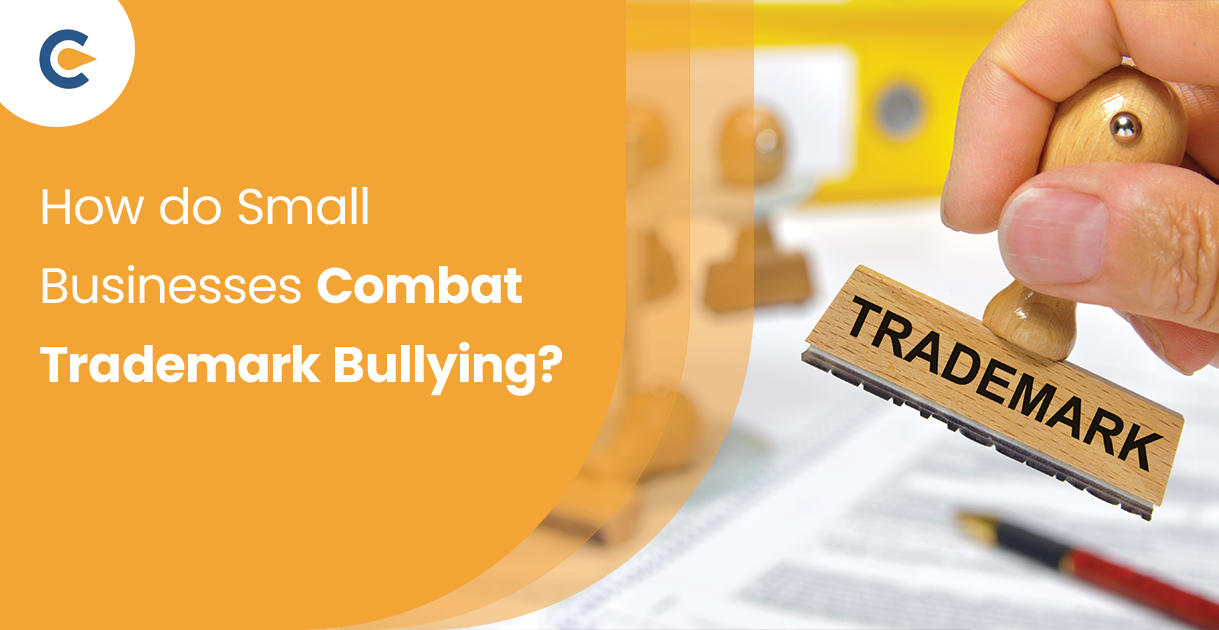Trademark bullying, a practice where large companies assertively and unreasonably enforce their Trademark Rights, can be a major problem for small businesses and startups.
Receiving aggressive legal notices, lawsuit threats, or baseless trademark infringement claims from big corporations can leave small business owners feeling scared and helpless. However, there are ways for small businesses to protect their brands and effectively deal with trademark bullying. This article will discuss practical steps small businesses can take to address trademark bullying, safeguard their brand identities, and defend their Intellectual Property Rights.
Strategies that Work as a Shield against Trademark Bullying
Here are some simplified strategies for small businesses dealing with trademark bullying:


- Recognising and Understanding the Trademark Bullying:
Trademark bullying is bound to happen when a big company uses its power and resources unfairly to scare smaller companies with its trademarks. They might send threatening legal letters, make false claims without proper basis, or try to block fair competition and new ideas coming their way by misusing their Trademark Rights.
- Seeking Legal Support and Guidance:
You can seek help from a Trademark lawyer if your Small Business faces trademark bullying. They should consult an Intellectual Property attorney with trademark experience right away.
The lawyer can look at the Trademark claims carefully to see if they have merit. They will analyse how strong a case the Small Business has and give advice on the best way to respond to the bullying while protecting the company’s interests.
- Examine the validity of the Trademark Claims:
When faced with a trademark infringement allegation, small businesses need to thoroughly analyse the claim’s legitimacy. It involves assessing potential consumer confusion between the small business’s brand and the Trademark being asserted.
Key factors to consider include how alike the Trademarks are, whether the products or services offered by each company are similar or related, and the geographical areas where each brand operates. Carefully evaluating these elements will help determine the strength of the trademark claim and the chances of mounting a successful defense against it.
- Exploring and considering the counterclaims or Oppositions:
When a Trademark bullying claim appears baseless or excessively forceful, Small Businesses can consider taking legal action to dispute the validity or enforceability of the Trademark in question.
One approach is to file counterclaims alleging that the trademark has been abandoned, obtained through fraudulent means, or has become too generic for legal protection.
Another strategy is to initiate an opposition proceeding directly with the Trademark office to challenge the registration of the asserted Trademark. These legal avenues provide ways for small businesses to defend their brands against aggressive and unjustified Trademark claims proactively. Trademark registration intends to safeguard legitimate trademarks. However, it can be misused in an exercise known as trademark bullying.
- Attempt to Negotiate a Resolution:
In certain situations, trying to reach a negotiated settlement can be the wisest and most economical approach to resolving Trademark conflicts without going through expensive litigation. Small Businesses should initiate a positive and constructive dialogue with the Trademark owner to explore finding a mutually agreeable solution.
The aim should be to arrive at a compromise that safeguards the small business’s ability to use its brand while also accommodating any legitimate concerns raised by the Trademark owner.
Engaging in open communication and seeking a middle ground can often lead to a quicker and less costly resolution compared to a drawn-out legal fight.
- Using Public Relations and Seeking Advocacy:
Small Businesses can employ public relations and advocacy techniques to raise awareness of Trademark bullying tactics and rally support from customers, trade organizations, and support groups.
Launching social media efforts, issuing press statements, and connecting with key allies can help expose unfair Trademark practices and put public pressure on the bullying company to rethink its actions. By telling their story and building a network of supporters, Small Businesses can shine a light on Trademark misuse and gain valuable allies in defending their brand against aggressive legal threats.
- Consider Alternative Dispute Resolution:
Small Businesses can look into Alternative Dispute Resolution methods for settling Trademark conflicts that don’t involve going to court, such as Mediation or Arbitration. These options provide a less confrontational and more streamlined approach to finding a resolution.
With the help of an impartial Mediator or an Arbitrator, both sides can negotiate and work towards an agreement without the lengthy process, high expenses, and unpredictability that often come with lawsuits.
Mediation and Arbitration can create a setting where parties can collaboratively problem-solve and reach a mutually acceptable solution while avoiding the downsides of Traditional Litigation.
The Final Words
In summary, trademark bullying presents a serious obstacle for small businesses trying to safeguard their brand identities and intellectual property. However, by being proactive, and strategic, and enlisting the help of legal professionals and supportive networks, Small Companies can successfully tackle bullying tactics and protect their brands from excessive Trademark claims.
The key is for small businesses to educate themselves about the issue, consult with trademark attorneys, consider negotiation and advocacy options, and take advantage of Alternative Dispute Resolution methods like Mediation. By being assertive and using these strategies, Small Businesses can defend their legal rights, secure their brand identities, and succeed in the competitive business world, even in the face of challenges.
Frequently Asked Questions
Why is trademark bullying a problem for small businesses?
Trademark bullying can leave small business owners feeling scared and helpless, as they may not have the resources to defend against aggressive legal actions from big corporations.
How can a small business recognise trademark bullying?
Signs of trademark bullying include receiving threatening legal letters, false claims of infringement without proper basis, or attempts by a larger company to misuse its trademark rights to stifle competition or new ideas.
What should a small business do if comes across trademark bullying?
Small businesses should seek legal guidance from an intellectual property attorney with trademark experience to evaluate the validity of the claims and advise on the best response strategy.
How can a small business examine the validity of a trademark claim?
Small businesses should assess factors like the similarity between the trademarks, the relatedness of the products or services, and the geographical areas where each brand operates to determine the likelihood of consumer confusion and the strength of the trademark claim.
What legal actions can a small business take against trademark bullying?
Small businesses can file counterclaims challenging the validity or enforceability of the asserted trademark, initiate opposition proceedings with the trademark office, or explore negotiating a settlement agreement.
How can public relations and advocacy help with trademark bullying?
Small businesses can use social media, press statements, and connections with trade organisations or support groups to raise awareness, garner public support, and put pressure on the bullying company to reconsider its actions.
What are alternative dispute resolution methods for trademark conflicts?
Mediation and arbitration are alternative dispute resolution methods that provide a less confrontational and potentially less expensive way to resolve trademark conflicts without going to court.
What is the key for small businesses to effectively tackle trademark bullying?
The key is to be proactive, and strategic, and enlist the help of legal professionals and supportive networks. Small businesses should educate themselves, consider negotiation and advocacy options, and take advantage of alternative dispute resolution methods like mediation.
Read our article Understanding The Things That Can Be Trademarked











